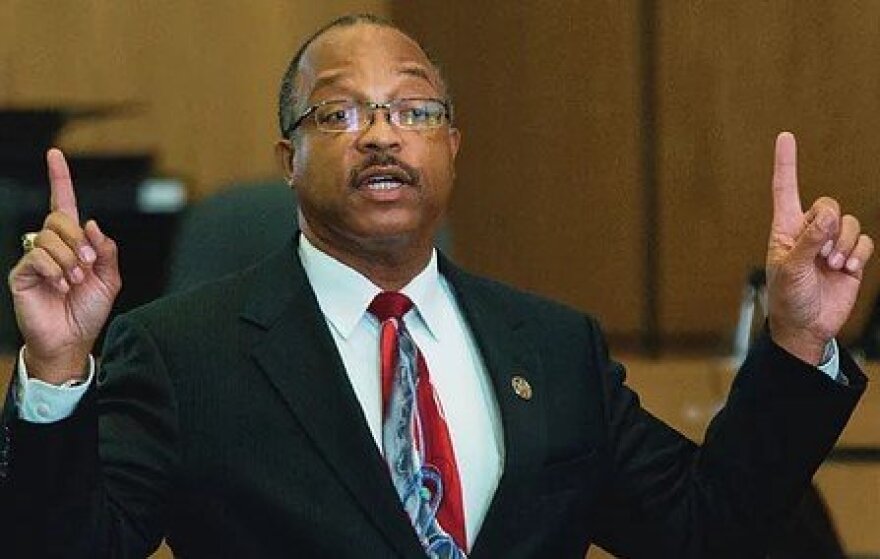LAS CRUCES - Doña Ana County Sheriff Kim Stewart and District Attorney-elect Gerald Byers both argue the state should look to the Law Enforcement Academy for police reform, not the courts.
“If lawsuits worked to mend bad behavior, we wouldn’t have any bad behavior, because we’ve seen significant lawsuits for hundreds of years,” Stewart said.
Stewart and Byers were among the nine members selected for a temporary civil rights commission headed by former Supreme Court Justice Richard Bosson and charged with proposing legislation for the upcoming session.
The commission’s draft bill calls for the state to end qualified immunity for police officers and other state workers, making it easier to file claims against them in civil court.
In its final report, the commission notes that the state can be sued if somebody slips and falls in a government building but can’t be sued for violations of fundamental rights under the state Constitution.
“It’s time to hold public officials accountable for violating those rights,” the report said.

Stewart and Byers both said they were shocked when other commission members wanted to make government agencies pay claims, not the person accused of wrongdoing.
“If the theory is, we need to hold bad actors accountable, how do you hold them accountable when cities and counties and states are paying the bill?” Stewart asked.
Supporters argued that government agencies would demand higher standards if they were responsible for paying legal settlements and judgments.
Stewart and Byers, both Democrats, were among four commission members who signed a letter opposing the recommendation. The others were state Sen. Steven Neville, R-Farmington, and Victor Rodriguez, former police chief for Belen. Bosson was joined by Vice Chairman and former federal prosecutor Mark Baker, Judge Stan Whitaker, Las Cruces attorney Denise Torres and Albuquerque attorney Zackeree Kelin in supporting the proposed bill.
Byers differed from the other dissenters in that he does support maintaining qualified immunity.
“If there’s a violation, there should be a way to approach a remedy,” he said. “But I believe we’re playing with fire if we remove qualified immunity.”
Byers said he joined with the dissenters because he didn't think the commission took the right approach to the problem.
“We were given a mandate that was a false mandate. [It] didn’t square up with reality,” Byers said. “We were asked to look at the wrong thing.”
Byers described qualified immunity as “a doctrine developed in the federal court system, which is used as a defense to shield public officials/employees from liability for discretionary actions done within the scope of their employment that resulted in a violation of a plaintiff’s civil right(s).”
He said testimony before the committee by state Law Enforcement Academy Director Kelly Alzaharna showed where they should have focused their attention.
“I was really shocked there was such a paucity of accountability that is applied by the certification agency,” Byers said. “That sends a signal loud and clear to the officers that if they are engaged in conduct unbecoming, nothing is going to be done about it.”
He said the legislature should focus on making the Law Enforcement Academy a “very robust institution” that can help small agencies throughout the state with continual training and specialization.
Stewart agreed that modernization and uniformity of standards are needed, and she said Alzaharna was the right person to lead that process.
“We’re lucky to have a very able director. The only thing holding her back is time, attention and money,” Stewart said.
She said the director and the academy board should work to establish a curriculum of best practices for agencies throughout the state.
“If we addressed the shortcomings with our current law enforcement in this state on the front end and brought our performance up to best practices, we wouldn’t be getting sued on the back end,” she said.
The civil rights commission was created as part of a larger police reform bill passed by the legislature during a special session in June. It came in the wake of protests here and throughout the world following the murder of George Floyd, a black man, during a May 25 police stop in Minnesota.
Byers, who, in January will become the state’s first black district attorney after winning an uncontested race in November, said his life experiences give him a different perspective on the issue.
“I remember my experiences as a kid. The reality was, yeah, you can have all the laws you want, but unless it’s real for you, it doesn’t exist,” he said.
He remembers asking his dad about the part of the Pledge of Allegiance that promises “justice for all.”
“He told me it’s what we aspire to. It’s where we’re heading.”
Byers stressed that all nine members of the commission were striving for the same result.
“I believe each commissioner firmly agrees on that basic premise. It’s just that we each took issue with different ways to accomplish that goal.”
The bill is expected to be introduced when the legislature meets for a 60-day session starting in January.
Information on the Civil Rights Commission and the proposed legislation can be found at https://www.generalservices.state.nm.us/crc.aspx.
Walt Rubel can be reached at waltrubel@gmail.com.


